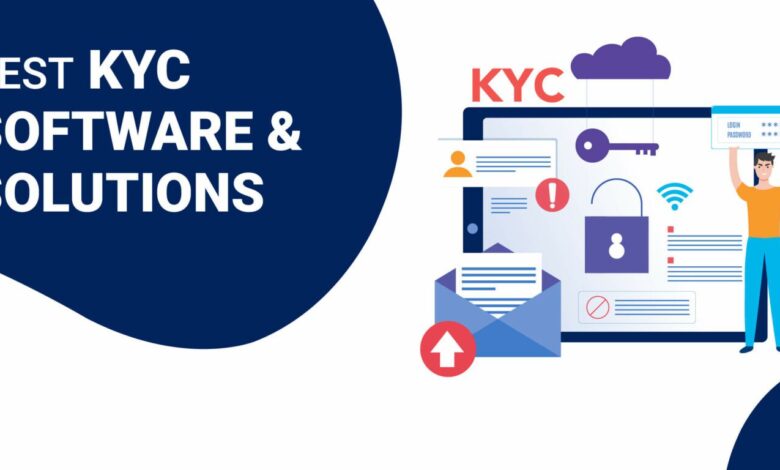KYC Solutions – An Advanced System of Monitoring Customer Risks

KYC (Know Your Customer) is a process businesses use to verify their customers. It ensures that the customers are not involved in any illegal activity like money laundering that can cause severe harm to the companies. Besides, KYC solutions are the strategies that help streamline the process in businesses. These solutions matter because they promote regulatory compliance, protection of businesses, customer trust, and risk management. It allows the quick verification of customers remotely and maintains a check on them to avoid any illegal theft. The system comprises identity verification, biometric authentication, address verification, watchlist screening, and ongoing monitoring.
Role of KYC in Preventing Fraud
KYC plays a critical role in preventing fraud and money laundering. Various organizations use KYC to observe customer performance. Businesses can mitigate the risk of being involved in any theft by complying with the rules and regulations of KYC.
- Identifying Fake Identities
One of the most common ways of committing theft is using fake identities. Such identities can be used to open bank accounts, take loans from banks, and bully someone pretending to be someone else. KYC can help avert this by verifying individuals through biometric and cross-referencing data.
- Screening for High-Risk Individuals
Another important role of KYC in preventing fraud and money laundering is its ability to screen customers for high-risk behavior. Some individuals or organizations are more likely to engage in illegal activities, especially in industries like finance, where large sums of money are involved.
- Ongoing Monitoring
KYC is not just a one-time process; it’s an ongoing effort to ensure that customers are not involved in fraudulent or illegal activities over time. This is particularly important because criminals can change tactics or try to hide their illegal activities once they have been successfully onboarded.
- Detecting Suspicious Activities
KYC solutions effectively detect the red flag in the businesses. It looks for activities such as unusual transaction size, frequent transactions, transactions from or to high-risk areas, and layering.
- Compliance and Reporting
KYC solutions also ensure compliance with AML and CTF regulations. The businesses are legally required to report the thefts and illegal activities to the high authorities.
Types of KYC Solutions
There are various types of KYC solutions depending on the customer’s risk, business, and regulatory requirements. The types include traditional, digital, and online identity verification, document verification, biometric verification, and enhanced due diligence.
- Traditional KYC Process
In the past, there was manual KYC processing which included the in-person collection of documents and verification.
- Digital KYC Process
The process involves technology to gather and verify data. This method works well when it comes to remote onboarding.
- Online Identity Verification
It is a digital method of the traditional KYC process. In this process, the customer needs to visit a branch for further processing.
- Document Verification
It is a crucial part of both the manual and digital KYC process. It involves the verification of all the documents to see if the customer is authentic.
- Biometric Verification
The process involves various authentication methods such as fingerprint, facial recognition, and voice recognition to verify the identity of the customer.
- Enhanced Due Diligence
It is an advanced form of KYC used for higher-risk customers. For example, if a customer comes from a high-risk country, is a politically exposed person (PEP), or has suspicious financial behavior, businesses need to perform more thorough checks.
- Simplified KYC for Low-Risk Customer
These customers typically have straightforward identities and are unlikely to be involved in illegal activities. Simplified KYC reduces the verification burden for these customers and helps businesses save time and resources.
KYC Solutions in Different Industries
Each industry may have its own specific needs and risks regarding KYC. Below, we’ll explore how KYC is applied in different sectors and the unique challenges or requirements each faces.
- Banks deal with significant amounts of money and personal information, and other financial organizations are leading the way in KYC procedures.
- Fintech (financial technology) businesses use technology to offer financial services, such as online money transfers, peer-to-peer lending, and mobile payments, frequently in an inventive way.
- Anonymity is a feature of cryptocurrencies like Bitcoin and Ethereum that criminals may use for illicit transactions or money laundering. KYC is therefore essential for cryptocurrency wallets, exchanges, and other blockchain-related platforms to adhere to legal requirements.
- To avoid fraud, maintain compliance, and comprehend the financial histories of their customers, insurance firms require KYC solutions.
- Online marketplaces and e-commerce platforms must progressively use KYC solutions as they expand, particularly when handling high-value transactions, payments, and sellers.
Conclusion
Hence, the future of KYC solutions looks promising as technology continues to advance. With growing concerns about data security, fraud prevention, and regulatory compliance, businesses will increasingly rely on smart KYC systems to address these challenges.



